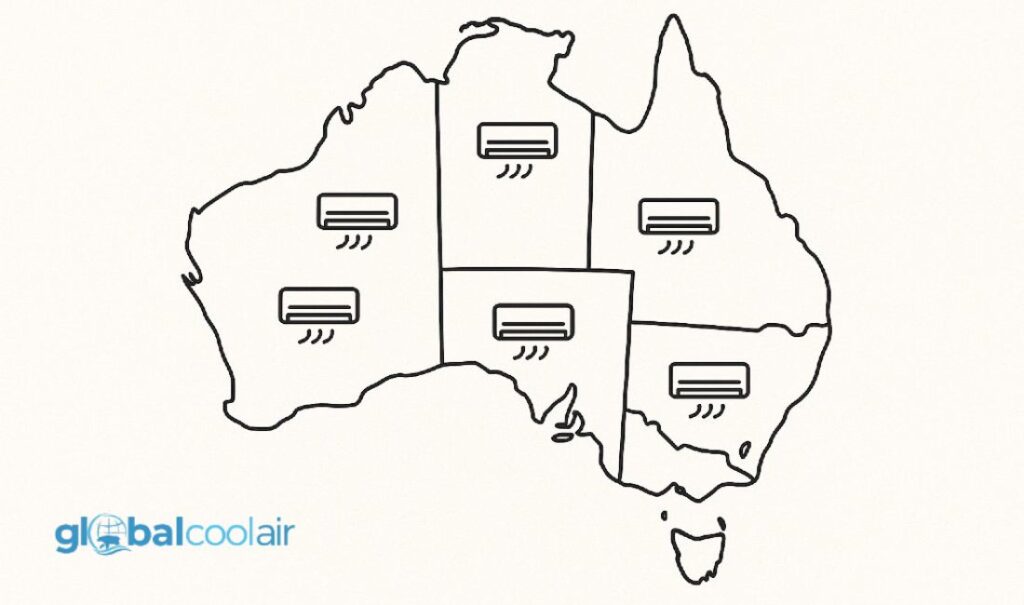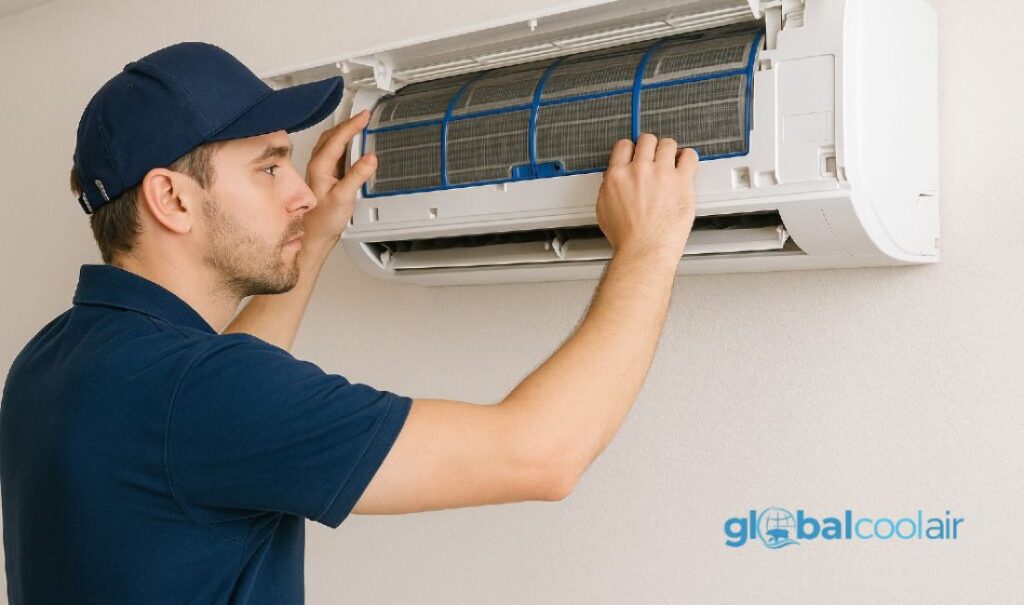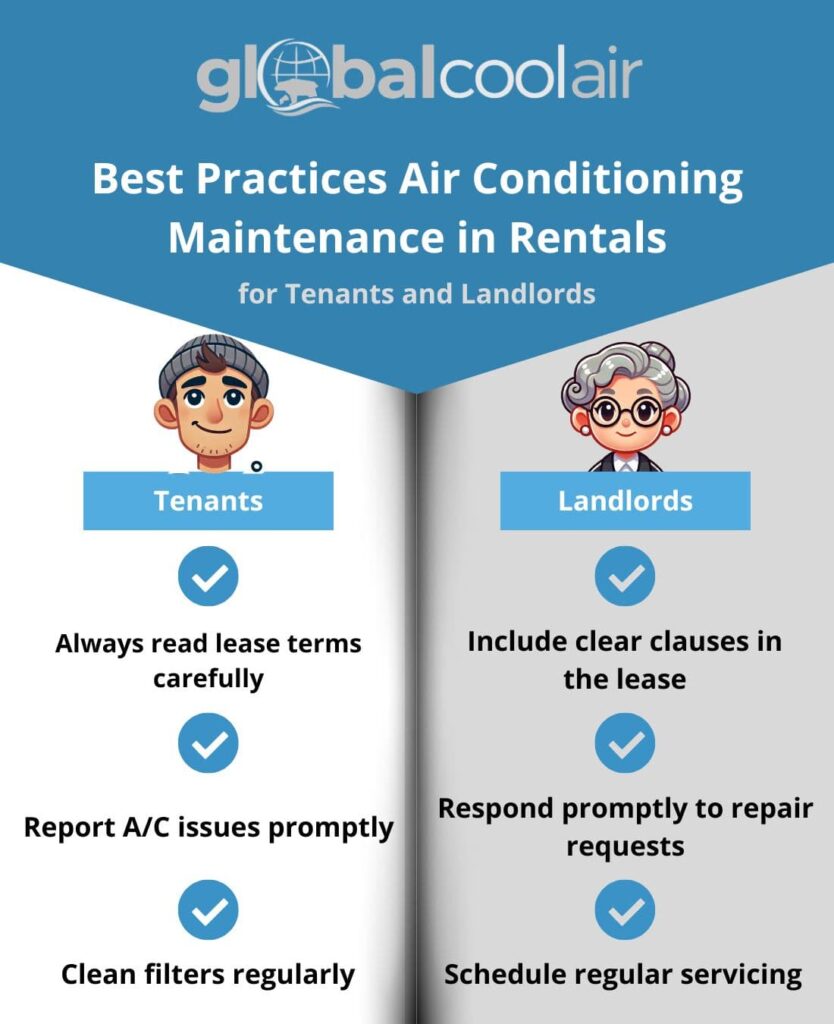Air conditioning is no longer a luxury in many parts of Australia — it’s essential for comfort, safety, and livability, especially during the hotter months.
But when you’re renting, a few key questions often arise: Who is responsible for air conditioning maintenance? Is it the landlord’s job to service or repair the AC? Can a tenant install an air conditioner if there isn’t one? Is the tenant responsible for air conditioning maintenance?
Navigating these responsibilities can be confusing, especially with different rules across states and unique lease agreements.
This guide provides a step-by-step explanation of all aspects, including what the tenant and landlord need to cover (including state-specific laws), as well as more concrete situations that you will encounter as a tenant or landlord regarding air conditioning in rental properties throughout Australia.
Who Is Responsible for Air Conditioning Maintenance?
Who is responsible for air conditioning maintenance? Landlords and tenants in Australia should understand who is responsible for repairing a particular unit if it develops a problem. Although the details may vary slightly with the lease agreement and state or territory, there are general rules applicable nationwide.
General Rule Across Australia
In the majority of cases, where the landlord provides the air conditioning unit, he or she is usually the one who is liable in terms of:
- Routine maintenance, especially when it is mentioned in the lease agreement.
- Repairs due to age, such as those parts which wear out naturally.
- Replacing units that are broken and which cannot be reasonably repaired.
This means that landlords should ensure their air conditioning systems are operational and safe, particularly during Australian summers. One of the requirements for tenants of residential property concerns maintaining a liveable environment.
Tenant Responsibilities
Conversely, tenants also play a role in maintaining air conditioning. These most often include:
- Making the unit dust-free, such as cleaning outside vents and replacing filters as needed.
- Report defects to the landlord or property manager as soon as possible to prevent the problems from escalating.
- Taking care to avoid misuse or damage, the tenant may be liable for the expenses incurred to repair or replace the AC due to misuse or damage.
Both parties need to communicate clearly what they want and refer to the lease for any particular conditions. If the lease mentions regular servicing, then both the tenant and the landlord must know who arranges and who pays for it.
As long as tenants and landlords are aware of who is responsible for air conditioning maintenance, they can avoid disputes and keep the system running properly throughout the year.

State-by-State Breakdown: Who Is Responsible for Air Conditioning Maintenance in Australia?
Although the general rule across Australia is that landlords are expected to maintain air conditioning if they have supplied it, there are slight variations in this regard among various states and territories. This is what renters and landlords need to know.
Queensland (QLD)
When it comes to determining who is responsible for the maintenance of air conditioning in QLD, the regulations are evident:
- Landlords are responsible for repairs and servicing of the unit, unless there’s clear evidence that the tenant has misused the appliance.
- The tenants are required to maintain the unit in a reasonably clean state (e.g., dusting filters), but are not obligated to provide professional services or repairs.
New South Wales (NSW)
Regarding the renters’ rights and air conditioning maintenance in NSW:
- Landlords should maintain the property in a reasonable state of repair, which includes keeping the air conditioning in good working order.
- In case of A/C unit provision, it should not be defective. If it fails, the landlord should undertake maintenance as soon as possible.
- The Residential Tenancies Act grants tenants the right to request urgent repairs, which may include addressing the malfunctioning of an air conditioner during extreme weather conditions.
Victoria (VIC)
Are landlords required to provide air conditioning in Victoria? The answer is:
- No, landlords are not legally required to provide air conditioning (A/C), but if it is installed in the rental unit, they must maintain it.
- Minimum rental standards require fixed heating in the main living area, but cooling (air conditioning) is not mandatory.
- Tenants cannot install an air conditioner without the landlord’s written permission. Any modifications need to be agreed upon in advance.
Western Australia (WA)
In WA, air conditioning isn’t legally required, but maintenance responsibilities are still clear:
- If the A/C unit is listed in the lease agreement or provided as part of the property, the landlord is responsible for maintaining it.
- Tenants must keep the air conditioner clean, including wiping vents and cleaning filters, but not performing any technical AC servicing from expert Perth AC technician.
- If a tenant wishes to add an air conditioning unit, the landlord’s written approval is required.
South Australia, Tasmania, ACT & Northern Territory
In these regions, similar principles apply regarding who is responsible for air conditioning maintenance:
- If air conditioning is supplied, the landlord must maintain it in good working order.
- Repairs must be carried out within a “reasonable time”, especially during high temperatures when A/C may be considered essential.
- In some cases, tenants can undertake urgent repairs themselves if the landlord fails to respond, with reimbursement possible afterwards.
Apartment tenants and landlords should learn how to approach the major differences in air conditioning duties according to each state so that they can better regulate and meet the standards of tenancy regulations. It does not matter whether you are in QLD, VIC, or WA; your lease agreement or local legislation will always specify who is responsible for air conditioning maintenance in your location.
| State/Territory | Landlord Must Provide A/C? | Who Maintains? | Can Tenants Install A/C? |
| QLD | No | Landlord (repairs), Tenant (filters) | Yes, with permission |
| NSW | No | Landlord | Yes, with permission |
| VIC | No (heating only mandatory) | Landlord | Yes, with permission |
| WA | No | Landlord | Yes, with permission |
| SA, TAS, ACT, NT | No | Landlord | Yes, with permission |
Do Landlords Have to Provide Air Conditioning?
The following question is one of the most popular among renters: Do landlords have to provide air conditioning? The short response is no, unless that is clearly defined in the lease.
Not a Legal Requirement in Most Cases
The use of air conditioning is not mandated by law in most states and territories in Australia. Most residential tenancy laws do not regard cooling as an essential service, although in some jurisdictions, heating may be considered essential.
However, when air conditioning is involved and is part of the lease agreement for renting, the landlord must ensure that it is well-maintained. This relates to the landlord’s larger duties regarding habitability and property maintenance.
Practical vs Legal Expectations
In warmer climatic regions, such as Queensland, the Northern Territory, or parts of Western Australia, air conditioning is often considered a necessity for comfortable living, especially during the summer months. However, the legal situation is that landlords are not obliged to provide air conditioning, except where it is specified in the lease or advertised as a feature of the property.
Is the Landlord Responsible for Cleaning the A/C?
As far as air conditioning in rental houses is concerned, one of the issues tenants want to know is: Is the landlord responsible for cleaning the A/C? This is dependent on the maintenance required.
In the vast majority of Australian residential tenancy laws, the maintenance of air conditioning systems is a shared obligation of both the landlord and the tenant, depending on the nature of the task.
Tenant Responsibilities
The day-to-day cleaning of the air conditioning unit is usually under the responsibility of tenants, and this entails:
- Clean or replace filters when necessary (depending on usage, 1 to 3 times per month).
- Cleaning the vents or removing outside dust from the machine allows air to flow through it.
Such maintenance is the tenant’s responsibility to clean, so it does not cause any damage.
Landlord Responsibilities
Conversely, landlords are responsible for more technical and long-term repairs such as:
- Professional work on servicing the air conditioner (particularly, before summer).
- Internal system cleaning, such as ductwork in a ducted aircon or condenser cleaning, where necessary.
- Any repairs due to age or fault will be covered, unless the tenants’ misuse causes the damage.
What the Lease Says Matters
In some cases, lease contracts include specific provisions regarding the servicing of air conditioning (A/C). In case it claims that the landlord maintains the A/C, he or she has to organise and spend money on professional cleaning.
Similarly, when the purpose of a filter change is discussed as an obligation of a tenant, the latter must remain up to date.
To ensure everything is clear in your lease and prevent any breakdowns or disagreements, mention any problematic issues promptly.

Can Tenants Install an Air Conditioner in a Rental Property?
A question to ask when it comes to rentals would be: Can tenants install an air conditioner? The immediate reply is YES, but with the written consent of the landlord.
An air conditioner is usually installed permanently, which can entail puncturing walls or making electrical installations, among other things, on the property. This makes the unit permanent, which is legally regarded as part of the property after it is installed. Consequently, it is necessary to obtain the landlord’s approval before moving.
What Tenants Should Know
When you are a tenant and you wish to put an A/C unit in:
- Nothing should be done without the landlord’s or agent’s written permission.
- One should come up with a straightforward agreement in writing regarding:
- Who pays for installation?
- The possibility of having the unit removed at the expiry of the lease.
- Whether some reimbursement can be given.
- The unit can end up as the landlord’s property if there are no clear terms.
Alternatives to Permanent Installation
In numerous instances, landlords can propose the following to tenants:
- Use a portable air conditioner, which doesn’t alter the structure of the room.
- Avoid using a split system or wall-mounted unit unless a written agreement is in place.
- Returning the property to be in the same state at the end of the lease (patch holes or take out the AC, which has been agreed on).
Always discuss the terms in advance and document any agreements to avoid future disputes or financial loss.
Common Scenarios: Who Is Responsible for Air Conditioning Maintenance?
Understanding who is responsible for air conditioning maintenance becomes clearer when you examine real-life examples. These are three common scenarios between tenants and landlords, along with how the respective duties are fulfilled.
Scenario 1: The A/C Breaks During a QLD Summer
It is the middle of January in Queensland, and the air conditioner breaks down. The renter is left sweating in the heat.
- What should the tenant do?
- The tenant should inform the landlord or the property manager immediately.
- Who is responsible?
- In QLD, the repair of air conditioning (A/C) falls to the landlord, particularly in cases where the A/C was included in the lease.
- Suppose the malfunction leads to or impacts the habitation of the property in some way. In that case, it may be regarded as an emergency repair, as per the provisions of the Residential Tenancies Authority (RTA). The landlord should complete the task within a reasonable timeframe.
Scenario 2: Tenant Doesn’t Clean the Filter → Unit Clogs
A tenant has not been cleaning up the A/C filter in months. The mechanism clogs up and AC begins to leak water, or it operates sluggishly.
- Who is responsible?
- Basic A/C maintenance is the tenant’s responsibility, including cleaning filters and removing outside dust.
- If they occur due to improper maintenance (e.g., clogged filters), the tenant may be responsible for the repair costs associated with cleaning up.
- Prevention Tip:
- Regularly cleaning or replacing filters every 1–3 months can prevent costly issues and ensure the air conditioner runs efficiently.
Frequent filter cleaning/replacement (every 1-3 months) will help prevent expensive problems and ensure the air conditioner operates effectively.
Scenario 3: Tenant Wants to Install a Split System in VIC
A Victorian tenant is interested in installing an additional split-system air conditioning unit in his rental property for improved cooling during the summer months.
- Can they do it?
- Yes — but only with the landlord’s written consent.
- Important considerations:
- The installation also becomes permanent; hence, it is important to negotiate on who will pay, whether the installation can be removed when the lease terminates, and by whom the security bond will be paid if the property is restored.
- According to Victorian tenancy laws, landlords are not obligated to ensure that their properties have air conditioning, but they are required to repair old systems.
These common scenarios illustrate how tenants and landlords should learn more about their respective duties regarding air conditioning, communicate effectively with each other, and consult the lease document in cases of uncertainty.

Best Practices for Tenants and Landlords: Air Conditioning Maintenance in Rentals
Regarding who is responsible for air conditioning maintenance, effective communication and active practices will help prevent misunderstandings and financial expenses. These are a few of the best practices that tenants and landlords should follow to ensure the system does not break down, allowing us to remain calm and collected.
For Tenants: Know Your Responsibilities
- Always read lease terms carefully: Before investing in a rental agreement, ensure there is a provision that informs you about who has air conditioning obligations. This will outline what’s expected of you and what falls to the landlord.
- Report A/C issues in writing: When you experience difficulties with air conditioning, it is advisable to inform your landlord or property manager at the earliest possible time by putting this in writing. The breakdowns could be avoided by prompt reporting.
- Clean filters regularly: Basic cleaning is typically the responsibility of tenants, including cleaning the vents and changing or cleaning the A/C filters every 1-3 months. Failure to do so can result in low efficiency or damage, for which tenants might be held responsible.
For Landlords: Be Clear and Proactive
- Include clear clauses in the lease regarding A/C maintenance: State clearly who will clean, service, and repair the air conditioners. This ensures both parties are on the same page.
- Respond promptly to repair requests: When a tenant reports a broken air conditioner, respond quickly, especially during the hot summer months. A prolonged delay in repairs may compromise tenancy provisions, especially in areas where cooling is a necessity.
- Schedule regular servicing, especially before the summer months. Preventive maintenance is economical and makes tenants content. Organise professional service of air conditioning units at least once a year, preferably before warmer months come.
By following these best practices, tenants and landlords can manage air conditioning responsibilities smoothly, protect their investment, and maintain a comfortable living environment year-round.
Make Aircon Maintenance Less Burdensome!
Is the tenant responsible for air conditioning maintenance? It’s not really a question that can be answered by yes or no.
In most Australian states, the maintenance of air conditioning is the landlord’s responsibility, especially when the system is part of the rental premises. Some, however, can be transferred to the tenant in cases where the tenant causes damage or if specified in the agreement.
Whether you’re a tenant or a landlord, effective communication and well-documented agreements are essential. They make it easy to determine who is doing what and avoid expensive wrangles in future.
Global Cool Air makes the maintenance of the air conditioning system less burdensome for both landlords and tenants. All our expert technicians offer efficient, economical, and timely services, including professional air conditioning (A/C) servicing and repairs.
We cooperate with property managers, landlords, and tenants to ensure that all units where we operate run efficiently and last longer.
Global Cool Air can assist with scheduled services, emergency repairs, or seasonal tune-ups.
For enquiries or to make a service reservation, call us now.

